- Home
- Lisa Gardner
Love You More: A Novel Page 2
Love You More: A Novel Read online
Page 2
“Most of the time. You’re not drinking your beer.”
I looked down, as if noticing the bottle for the first time.
“Part of my recon,” Brian continued easily. “You’re holding a beer, but not drinking it. Would you prefer a margarita? I could get you one. Though,” he eyed the gaggle of wives, who were well into the third pitcher and laughing accordingly, “I’m a little afraid.”
“It’s okay.” I loosened my stance, shook out my arms. “I don’t really drink.”
“On call?”
“Not today.”
“I’m not a cop, so I won’t pretend to know the life, but I’ve been hanging out with Shane a good five years now, so I like to think I understand the basics. Being a trooper is way more than patrolling highways and writing tickets. Ain’t that right, Shane?” Brian boomed his voice, letting the common lament of any state trooper carry over the patio. At the grill, Shane responded by raising his right hand and flipping off his neighbor.
“Shane’s a whiner,” I said, letting my voice carry, as well.
Shane flipped me off, too. Several of the guys laughed.
“How long have you been working with him?” Brian asked me.
“A year. I’m a rookie.”
“Really? What made you want to be a cop?”
I shrugged, uncomfortable again. One of those questions everyone asked and I never knew how to answer. “Seemed like a good idea at the time.”
“I’m a merchant marine,” Brian offered up. “I work on oil tankers. We ship out a couple of months, then are home a couple of months, then out a couple of months. Screws with the personal life, but I like the work. Never boring.”
“A merchant marine? What do you do … protect against pirates, things like that?”
“Nah. We run from Puget Sound up to Alaska and back. Not too many Somali pirates patrolling that corridor. Plus, I’m an engineer. My job’s to keep the ship running. I like wires and gears and rotors. Guns, on the other hand, scare the crap out of me.”
“I don’t care for them much myself.”
“Funny comment, coming from a police officer.”
“Not really.”
My gaze had returned automatically to Sophie, checking in. Brian followed my line of sight. “Shane said you had a three-year-old. Holey moley, she looks just like you. No taking the wrong kid home from this party.”
“Shane said I had a kid, and you still took the bait?”
He shrugged. “Kids are cool. I don’t have any, but that doesn’t mean I’m morally opposed. Father in the picture?” he added casually.
“No.”
He didn’t look smug at that news, more like contemplative. “That’s gotta be tough. Being a full-time cop and raising a child.”
“We get by.”
“Not doubting you. My father died when I was young. Left my mother to raise five kids on her own. We got by, too, and I respect the hell out of her for it.”
“What happened to your father?”
“Heart attack. What happened to her father?” He nodded toward Sophie, who now appeared to be playing tag.
“Better offer.”
“Men are stupid,” he muttered, sounding so sincere that I finally laughed. He flushed. “Did I mention I have four sisters? These are the things that happen when you have four sisters. Plus, I have to respect my mom twice as much because not only did she survive being a single mother, but she survived being a single mother with four girls. And I never saw her drink anything stronger than herbal tea. How about them apples?”
“She sounds like a rock,” I agreed.
“Since you don’t drink, maybe you’re also an herbal tea kind of gal?”
“Coffee.”
“Ah, my personal drug of choice.” He looked me in the eye. “So, Tessa, maybe some afternoon, I could buy you a cup. Your neighborhood or my neighborhood, just let me know.”
I studied Brian Darby again. Warm brown eyes, easygoing smile, solidly built shoulders.
“Okay,” I heard myself say. “I would like that.”
Do you believe in love at first sight? I don’t. I’m too studied, too cautious for such nonsense. Or maybe, I simply know better.
I met Brian for coffee. I learned that when he was home, his time was his own. It made it easy to hike together in the afternoons, after I’d recovered from the graveyard shift and before I picked up Sophie from daycare at five. Then we caught a Red Sox game on my night off, and before I knew it, he was joining Sophie and me for a picnic.
Sophie did fall in love at first sight. In a matter of seconds, she’d climbed onto Brian’s back and demanded giddyup. Brian obediently galloped his way across the park with a squealing three-year-old clutching his hair and yelling “Faster!” at the top of her lungs. When they were done, Brian collapsed on the picnic blanket while Sophie toddled off to pick dandelions. I assumed the flowers were for me, but she turned to Brian instead.
Brian accepted the dandelions tentatively at first, then positively beaming when he realized the entire wilted bouquet was just for him.
It became easy, after that, to spend the weekends at his house with a real yard, versus my cramped one-bedroom apartment. We would cook dinner together, while Sophie ran around with his dog, an aging German shepherd named Duke. Brian bought a plastic kiddy pool for the deck, hung a toddler’s swing from the old oak tree.
One weekend when I got jammed up, he came over and stocked my fridge to get Sophie and me through the week. And one afternoon, after I’d worked a motor vehicle accident that left three kids dead, he read to Sophie while I stared at the bedroom wall and fought to get my head on straight.
Later I sat curled up against him on the couch and he told me stories of his four sisters, including the time they’d found him napping on the sofa and covered him in makeup. He’d spent two hours biking around the neighborhood in glittering blue eye shadow and hot pink lipstick before he happened to catch his reflection in a window. I laughed. Then I cried. Then he held me tighter and we both said nothing at all.
Summer slid away. Fall arrived, and just like that, it was time for him to ship out. He’d be gone eight weeks, back in time for Thanksgiving, he assured me. He had a good friend who always looked after Duke. But, if we wanted …
He handed me the key to his house. We could stay. Even girl the place up if we wanted to. Maybe some pink paint in the second bedroom, for Sophie. Couple of prints on the wall. Princess rubber duckies in the bathroom. Whatever it took to make us comfortable.
I kissed his cheek, returned the key to the palm of his hand.
Sophie and I were fine. Always had been, always would be. See you in eight weeks.
Sophie, on the other hand, cried and cried and cried.
Couple of months, I tried to tell her. Hardly any time at all. Just a matter of weeks.
Life was duller with Brian gone. An endless grind of getting up at one p.m., retrieving Sophie from daycare by five, entertaining her until her bedtime at nine, with Mrs. Ennis arriving at ten so I could patrol from eleven to seven. The life of a single working mom. Struggling to stretch a dime into a dollar, cramming endless errands into an already overscheduled day, fighting to keep my bosses happy while still meeting my young daughter’s needs.
I could handle it, I reminded myself. I was tough. I’d gotten through my pregnancy alone, I’d given birth alone. I’d endured twenty-five long, lonely weeks at the live-in Police Academy, missing Sophie with every breath I took but determined not to quit because becoming a state police officer was the best shot I had to provide a future for my daughter. I’d been allowed to return home to Sophie every Friday night, but I also had to leave her crying with Mrs. Ennis every Monday morning. Week after week after week, until I thought I’d scream from the pressure. But I did it. Anything for Sophie. Always for Sophie.
Still, I started checking e-mail more often because if Brian was in port he’d send us a quick note, or attach a silly picture of a moose in the middle of some Alaskan main street. By
the sixth week, I realized I was happier the days he e-mailed, tenser the days he didn’t. And Sophie was, too. We huddled together over the computer each night, two pretty girls waiting to hear from their man.
Then finally, the call. Brian’s ship had docked in Ferndale, Washington. He’d be discharged the day after tomorrow, and would be catching the red-eye back to Boston. Could he take us to dinner?
Sophie selected her favorite dark blue dress. I wore the orange sundress from the Fourth of July cookout, topped with a sweater in deference to the November chill.
Sophie, keeping lookout from the front window, spotted him first. She squealed in delight and raced down the apartment steps so fast I thought she’d fall. Brian barely caught her at the end of the walk. He scooped her up, whirled her around. She laughed and laughed and laughed.
I approached more quietly, taking the time for a last minute tuck of my hair, buttoning my light sweater. I stepped through the front door of the apartment complex. Shut it firmly behind me.
Then I turned and studied him. Took him in from eight feet away. Drank him up.
Brian stopped twirling Sophie. Now he stood at the end of the walk, my child still in his arms, and he studied me, too.
We didn’t touch. We didn’t say a word. We didn’t have to.
Later, after dinner, after he brought us back to his place, after I tucked Sophie into the bed across the hall, I walked into his bedroom. I stood before him, and let him peel the sweater from my arms, the sundress from my body. I placed my hands against his bare chest. I tasted the salt on the column of his throat.
“Eight weeks was too long,” he muttered thickly. “I want you here, Tessa. Dammit, I want to know I’m coming home to you always.”
I placed his hands upon my breasts, arching into the feel of his fingers.
“Marry me,” he whispered. “I mean it, Tessa. I want you to be my wife. I want Sophie to be my daughter. You and her should be living here with me and Duke. We should be a family.”
I tasted his skin again. Slid my hands down his body, pressed the full length of my bare skin against his bare skin. Shivered at the contact. Except it wasn’t enough. The feel of him, the taste of him. I needed him against me, I needed him above me, I needed him inside me. I needed him everywhere, right now, this instant.
I dragged him down to the bed, wrapping my legs around his waist. Then he was sliding inside my body and I groaned, or maybe he groaned, but it didn’t really matter. He was where I needed him to be.
At the last moment, I caught his face between my hands so I could look into his eyes as the first wave crashed over us.
“Marry me,” he repeated. “I’ll be a good husband, Tessa. I’ll take care of you and Sophie.”
He moved inside of me and I said: “Yes.”
3
Brian Darby died in his kitchen. Three shots, tightly clustered midtorso. D.D.’s first thought was that Trooper Leoni must’ve taken her firearms training seriously, because the grouping was textbook perfect. As new recruits learned at the Academy—never go for the head and never shoot to wound. Torso is the high percentage shot and if you’re discharging your weapon, you’d better be in fear for your life or someone else’s, meaning you’re shooting to kill.
Leoni had gotten the job done. Now, what the hell had happened to drive a state trooper to shoot her husband? And where was the kid?
Currently, Trooper Leoni was sequestered in the front sunroom, being tended by EMTs for an ugly gash in her forehead and even uglier black eye. Her union rep was already with her, a lawyer on his way.
A dozen other state troopers had closed ranks outside, standing stiff-legged on the sidewalk where they could give their Boston colleagues working the scene, and the overexcited press reporting the scene, thousand-yard stares.
That left most of the Boston brass and most of the state police brass to squabble amongst themselves in the white command van now parked at the elementary school next door. The homicide unit supervisor from the Suffolk County DA was presumably playing referee, no doubt reminding the Massachusetts State Police superintendent that the state really couldn’t oversee an investigation involving one of its own officers, while also reminding the commissioner of Boston Police that the state’s request for a state police liaison was perfectly reasonable.
In between bouts of marking turf, the head muckety-mucks had managed to issue an Amber Alert for six-year-old Sophie Leoni, brown hair, blue eyes, approximately forty-six inches tall, weighing forty-five pounds, and missing her top two front teeth. Most likely wearing a pink, long-sleeved pajama set dotted with yellow horses. Last seen around ten-thirty the previous evening, when Trooper Leoni had allegedly checked on her daughter before reporting for her eleven p.m. patrol shift.
D.D. had a lot of questions for Trooper Tessa Leoni. Unfortunately, she did not have access: Trooper Leoni was in shock, the union rep had squawked. Trooper Leoni required immediate medical attention. Trooper Leoni was entitled to appropriate legal counsel. She had already provided an initial statement to the first responder. All other questions would have to wait until her attorney deemed appropriate.
Trooper Leoni had a lot of needs, D.D. thought. Shouldn’t one of those include working with the Boston cops to find her kid?
For the moment, D.D. had backed off. Scene this busy, there were plenty of other matters that required her immediate attention. She had Boston district detectives swarming the scene, Boston homicide detectives working the evidence, various uniformed officers canvassing the neighborhood, and—given that Trooper Leoni had shot her husband with her service Sig Sauer—the firearms discharge investigation team had been automatically dispatched, flooding the small property with even more miscellaneous police personnel.
Bobby had been right—in official lingo, this case was a cluster-fuck.
And it was all hers.
D.D. had arrived thirty minutes ago. She’d parked six blocks away, on bustling Washington Street versus a quieter side street. Allston-Brighton was one of the most densely populated neighborhoods in Boston. Filled to the brim with students from Boston College, Boston University, and Harvard Business School, the area was dominated by academics, young families, and support staff. Expensive place to live, which was ironic given that college students and academics rarely had any money. End result was street after street of tired, three-story apartment buildings, each carved into more units than the last. Families were piled in, with twenty-four-hour convenience stores and Laundromats sprouting up to meet the continuous demand.
This was the urban jungle in D.D.’s mind. No wrought-iron balustrades or decorative brickwork like Back Bay or Beacon Hill. Here, you paid a fortune for the honor of renting a strictly utilitarian box-like apartment in a strictly utilitarian box-like building. Parking was first come first serve, which meant most of the masses spent half their time cruising for spaces. You fought your way to work, you fought your way home, then ended the day eating a microwavable dinner in a standing room only kitchenette, before falling asleep on the world’s smallest futon.
Not a bad area, however, for a state trooper. Easy access to Mass Pike, the main artery bisecting the state. East on the Pike hit I-93, west brought you to 128. Basically, in a matter of minutes, Leoni could access three major hunting grounds for the trooper on patrol. Smart.
D.D. also liked the house, an honest to goodness single-family dwelling plunked down in the thick of Allston-Brighton, with a tidy row of three-story apartment buildings on one side and a sprawling brick elementary school to the other. Thankfully, being Sunday, the school was closed, allowing the current mass of law enforcement to take over the parking lot while sparing them from further drama caused by panicky parents overrunning the scene.
Quiet day in the neighborhood. At least it had been.
Trooper Leoni’s vintage two-bedroom bungalow was built into a hillside, white-dormered structure stacked over a redbricked two-car garage. A single flight of concrete steps led from the street-level sidewalk up to the front doo
r and one of the largest yards D.D. had ever seen in downtown Boston.
Good family home. Just enough space to raise a kid inside, perfect lawn for a dog and a swing set outside. Even now, walking the lot in the dead of winter, D.D. could picture the cookouts, the playdates, the lazy evenings hanging on the back deck.
So many things that could go right in a house like this. So what had gone wrong?
She thought the yard might hold the key. Big, sprawling, and completely unprotected in the midst of population overload.
Cut through the school parking lot, walk onto this property. Emerge from behind four different apartment buildings, walk onto this property. You could access the Leoni residence from the back street, as D.D. had done, or by walking up the concrete steps from the front street, as most of the Massachusetts state police seem to have done. From the back, the front, the right and left, the property was easy to enter and easier to exit.
Something every uniformed officer must have figured out, because instead of studying a pristine sweep of white snow, D.D. was currently looking at the largest collection of boot imprints ever amassed in a quarter acre.
She hunched deeper into her winter field coat and exhaled a frustrated puff of frosty breath. Fucking morons.
Bobby Dodge appeared on the back deck, probably still searching for his vantage point. Given the way he was frowning down at the mucked-up snow, his thoughts mirrored her own. He caught sight of her, adjusted his black brimmed hat against the early March chill, and walked down the deck stairs to the yard.
“Your troopers trampled my crime scene,” D.D. called across the way. “I won’t forget that.”
He shrugged, burying his hands in his black wool coat as he approached. A former sniper, Bobby still moved with the economy of motion that came from spending long hours holding perfectly still. Like a lot of snipers, he was a smaller guy with a tough, sinewy build that matched his hard-planed face. No one would ever describe him as handsome, but plenty of women found him compelling.
Once upon a time, D.D. had been one of those women. They’d started out as lovers, but discovered they worked better as friends. Then, two years ago Bobby had met and married Annabelle Granger. D.D. hadn’t taken the wedding well; the birth of their daughter had felt like another blow.

 Find Her
Find Her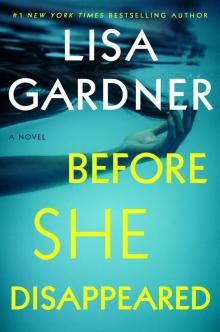 Before She Disappeared
Before She Disappeared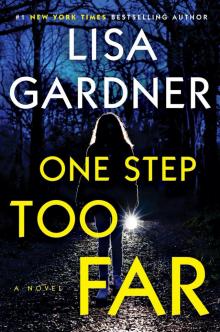 One Step Too Far
One Step Too Far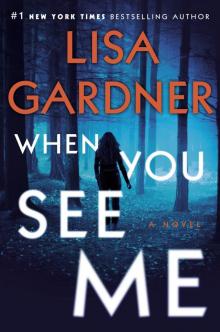 When You See Me
When You See Me Never Tell
Never Tell Touch & Go
Touch & Go The Survivors Club
The Survivors Club MacNamara's Woman
MacNamara's Woman Love You More: A Novel
Love You More: A Novel Gone
Gone The Perfect Husband
The Perfect Husband Maggie's Man: A Family Secrets
Maggie's Man: A Family Secrets The 7th Month
The 7th Month The Neighbor
The Neighbor Hide
Hide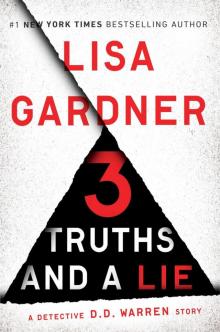 3 Truths and a Lie
3 Truths and a Lie Catch Me
Catch Me Fear Nothing: A Detective
Fear Nothing: A Detective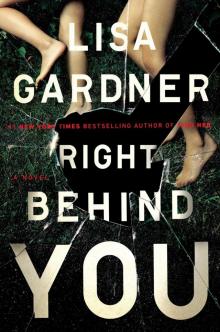 Right Behind You
Right Behind You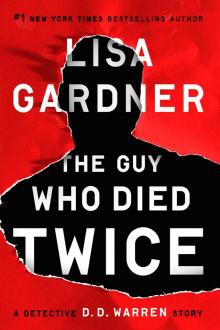 The Guy Who Died Twice
The Guy Who Died Twice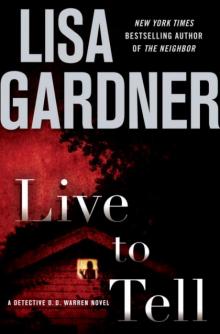 Live to Tell: A Detective D.D. Warren Novel
Live to Tell: A Detective D.D. Warren Novel Live to Tell
Live to Tell Maggie's Man: A Family Secrets Novel
Maggie's Man: A Family Secrets Novel The Other Daughter
The Other Daughter Alone
Alone Crash & Burn
Crash & Burn The Detective D. D. Warren Series 5-Book Bundle
The Detective D. D. Warren Series 5-Book Bundle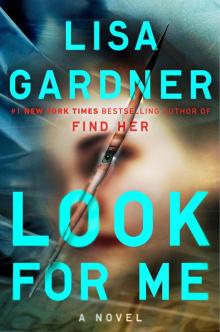 Look for Me
Look for Me Love You More
Love You More The FBI Profiler Series 6-Book Bundle
The FBI Profiler Series 6-Book Bundle The Third Victim (Quincy / Rainie)
The Third Victim (Quincy / Rainie) Say Goodbye
Say Goodbye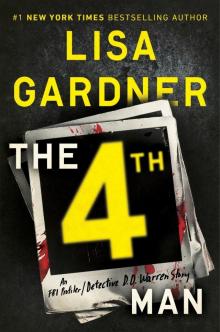 The 4th Man
The 4th Man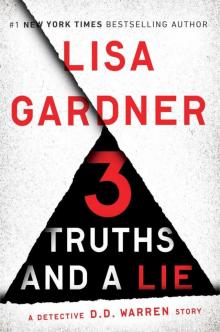 3 Truths and a Lie: A Detective D. D. Warren Story (Kindle Single)
3 Truths and a Lie: A Detective D. D. Warren Story (Kindle Single) Brandon's Bride
Brandon's Bride